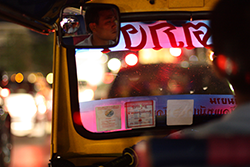Picture, if you will, a tall man walking around Athens. He is staring at the buildings, unable to read the signs. He has only a vague idea of where he is. He has a wild mane of graying hair poking out from under his Gatsby cap, and he would never be mistaken for a Greek.
He’s my father-in-law.
This was some years ago. He told us the story later: A man approached him and introduced himself. He said he’d lived in the United States and wanted to practice his English. My father-in-law said he was in a hurry, but the man insisted on buying him a drink. So he shrugged and went along to a little bar around the corner.
They talked for a few minutes. Then a couple of women joined them, and soon the man disappeared. The women were friendly — very friendly — and started ordering drinks. Then more drinks. “Boy,” my father-in-law thought, “these Greeks sure are friendly.” And then, “I wonder who’s paying for all these drinks?” As he got up to leave, he was presented with a bill for $30.
He got his answer: The sucker was paying.
Tourism, even in its legitimate form, is an extractive industry, mining the pockets of outsiders. Often, there’s a fine line between a lawful transaction and a scam. But the fact is that most of us who travel will be scammed at some point, whether it’s by a money changer, a market vendor, or a mobster. They can see you coming from miles away — your clothes, your gait, the way you look around. You try to blend in. But they still find you.
Some scams are timeless, and replicated in various permutations throughout the world. There is the police scam, in which someone purporting to be a police officer tries to extract a bribe for some “problem” with your passport. (Tell him to follow you to the nearest police station.) There’s the rear-ending scam, in which a car in front of you slams on the brakes, then someone removes your luggage from your trunk. (Keep your bags in the car with you.) There’s the bird dropping/mustard scam, in which the moment you find yourself covered with a given substance, someone mysteriously appears with a towel to clean you off — meanwhile, also cleaning out your wallet. (Keep your wits about you.)
Scams often are more of an annoyance than a real danger. They are also relatively rare. You shouldn’t go around suspecting that everyone is out to steal your wallet. Kindness, generosity, and altruism are the currency of social interaction, and no society can function without them. Still, anonymity is the enemy of altruism, and the shallow relationships of travel are too much for some elements to resist.
By definition, a scam is something you don’t figure out until it’s happened. When my wife and I moved to Bangkok, Thailand, we fell for a scam we had actually read about.
We were walking along the wall of the royal palace when a guy came up to us. “Hello,” he said. “How are you today?” His English was suspiciously polished. He asked where we were going, and we told him.
“Oh, sorry, the palace is closed today,” he said. “Thai holiday! But there is another temple that is open.” He flagged down a seemingly random túk-túk. As if hypnotized, we climbed on.
The túk-túk sped off and took us to a tailor shop. We went in, looked around, slightly confused, then came out. The driver wasn’t happy. “Okay. We go one place, then I take you to see standing Buddha.”
He pulled into a small alleyway filled with túk-túks bearing other farang (foreigners). He pointed to the door of a large gem store. We went in, looked around again, then came out.
“No, no!” he said. “You go too fast. You go back, take long time looking.”
“We don’t want to buy anything.” I said.
“No problem,” he said. “You just looking, I get free rotang.”
“Free what?” I asked.
He pointed to his gas tank, and I understood. We went into the shop and browsed through several floors of overpriced, possibly fake gems. When we finally came out, the driver gave us the thumbs up. His tank was full.
The standing Buddha was a beautiful, tall statue, all in gold. There were no other tourists anywhere. We took photos, got a bite to eat, and went to catch our ride back home. But the driver was long gone, so we walked back to our hotel, knowing we’d been taken for a ride. At least it was a free one.
Every human interaction entails some risk. When you travel out of your country, that risk grows, but so does the reward. If you wanted to hedge your bets and never lose, you would never leave home in the first place. That risk is part of the thrill of being abroad: learning new rules, mastering new games.
The trick is to know which ones to avoid at all costs, and which ones you can safely embrace. Chances are you will lose a few and win a few, or at least come out even. You will meet many more good people than bad. But if you do meet someone who outsmarts you, don’t let it ruin your day, or your trip.
Because, as my father-in-law said after he’d paid his dues in that Greek bar, “I figured it was just the price of a good story.” • 5 April 2013




